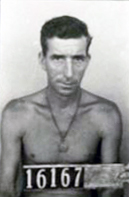John Harold Garnett
From Our Contribution
 | |
| Personal Information | |
|---|---|
| Date of Birth | 7 Oct 1905 |
| Place of Birth | Cheshire, England |
| Death | 1975, aged 69 |
| Place of Death | Box Hill, Victoria |
| Age at Enlistment | 34 years, 5 months |
| Description |
5'9½" (1.76m) tall ; 156lbs 70.76 kg ; fair complexion ; blue/grey eyes ; dark brown hair ; s car on left wrist |
| Occupation | Farm hand |
| Religion | Church of England |
| Address | Bedfordale, Western Australia |
| Next of Kin | Wife , Mrs Agnes Garnett |
| Military Information | |
| Reg Number | 16167 |
| Date of Enlistment | 15 Apr 1940 |
| Rank | Corporal |
| Unit/Formation | No. 1 Stores Depot RAAF (Port Melbourne) |
| Post War Details | |
| Fate | Remained in Australia |
| Medals |
Defence Medal War Medal 1939-45 Australian Service Medal 1939-45 |
Pre War
War Service
At enlistment gave his father in Liverpool, UK as NOK. He was to later change this to his wife following their marriage. At enlistment he had to sign a guarantee that he would at his own cost have necessary dental work undertaken. Mustered as a Service Policeman, he spent the first few days being outfitted before being sent to the No. 4 Recruit Depot RAAF at Pearce in WA. On 121 May 1940 he was transferred to No. 4 School of Technical Training RAAF and following training, and then on 19 Aug 1940 he was transferred to No. 1 Recruit Depot RAAF to be held there until posted to an operational unit. On 30 Sep 1940 John was made an Acting Corporal and soon after, on 5 Oct 1940 John was posted to No. 1 School of Technical Training RAAF to undertake the No. 29 Service Police course. While there he was granted eight days leave from 28 Nov 1940. John was appointed as a Leading Aircraftman on 13 Feb 1941 and his mustering changed to Labourer on 20 Mar 1941. He was granted further leave from 14 - 17 April and from 1 - 11 Sep 1941.
On 26 Feb 1942 John was posted to No. 1 Embarkation Depot RAAF at Ascot Vale with his next posting to RAAF HQ Darwin on 3 Mar 1942 as a Temporary Corporal. It is possible that he did not move to Darwin until his unit did as he had been allocated to the newly formed No. 1 Mobile Works Squadron which had been formed at Ascot Vale on 26 May 1942. The unit them moved to Pine Creek in the Northern Territory where it began construction of the Advanced Air Headquarters at Coomalie Creek, setting up sawmills «nd crushing plants to make use of local materials. They had also begun work on the Fenton and Hughes Airfields, and an additional detachment was sent north to carry out a wet weather program at Noonamah. In late August the Squadron moved to Coomalie Creek, where quarters had previously been constructed. Once settled in, the unit began to build the facilities for No. 1 Medical Receiving Station. Ironically, on 19 Jun 1942 John was admitted to No. 1 Medical Receiving Station RAAF at Daly Waters, Northern Territory. No. 1 Mobile Works Squadron was later known as No. 1 Airfield Construction Squadron RAAF.
It appears that John was transferred to No.3 Mobile Works Unit before he left hospital, and this unit subsequently became No. 3 Mobile Works Squadron and then No. 3 Airfield Construction Squadron RAAF which was also active in the Northern Territory during 1942 and 1943. John was transferred to the No. 55 Operational Base Unit's Pool at Birdum on 23 Jun 1943 before being sent south on 8 Jul 1943 to No. 2 Embarkation Depot RAAF at Bradfield Park. It was during 1943 that he married Agnes Fleming. John was posted to No. 1 Stores Depot RAAF at Port Melbourne on 3 Aug 1943 and finally to No. 1 Personnel Depot to take discharge on 26 Jun 1945.
Post War
Discharge address was: 3 Denver Crescent, Easternwick, Victoria, employed by the Victorian State Electricity Commission as a Trades Assistant. Electoral Roll entries: 1949 at 1227 Dandenong road, Malvern East, Victoria; 1954 - 1977 at 44 Monash street, Box Hill, Victoria, storeman, Agnes a stenographer;
Notes
Mobile Works Squadrons were the initial RAAF equivalent of Army Engineers, with a primary task of constructing and maintaining forward airfields, runways and support infrastructure in the Pacific Campaign. They were raised in 1942 following the entry of Japan into the war. It was immediately evident that there was a paucity of airstrips across the South West Pacific Area to support air operations. Their designation was progressively changed and Airfield Construction Squadrons were formed from the Mobile Works Squadrons of the same numeric designation.